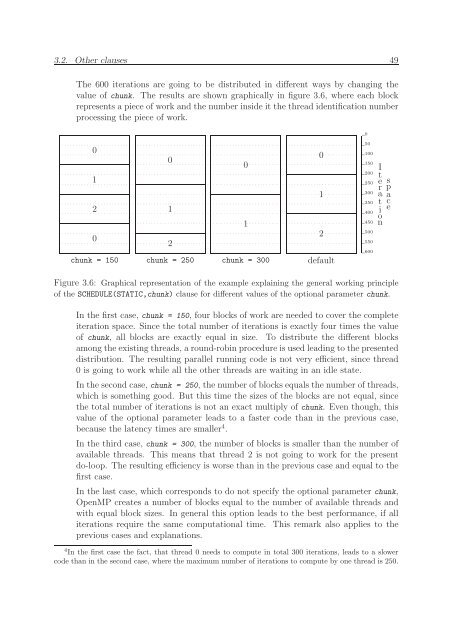Parallel Programming in Fortran 95 using OpenMP - People
Parallel Programming in Fortran 95 using OpenMP - People
Parallel Programming in Fortran 95 using OpenMP - People
You also want an ePaper? Increase the reach of your titles
YUMPU automatically turns print PDFs into web optimized ePapers that Google loves.
3.2. Other clauses 49<br />
The 600 iterations are go<strong>in</strong>g to be distributed <strong>in</strong> different ways by chang<strong>in</strong>g the<br />
value of chunk. The results are shown graphically <strong>in</strong> figure 3.6, where each block<br />
represents a piece of work and the number <strong>in</strong>side it the thread identification number<br />
process<strong>in</strong>g the piece of work.<br />
0<br />
0<br />
0<br />
0<br />
0<br />
1<br />
1<br />
2<br />
1<br />
1<br />
0<br />
2<br />
2<br />
chunk = 150 chunk = 250 chunk = 300 default<br />
50<br />
100<br />
150<br />
200<br />
250<br />
300<br />
350<br />
400<br />
450<br />
500<br />
550<br />
600<br />
I<br />
t<br />
e r<br />
a<br />
ti<br />
o<br />
n<br />
s<br />
p<br />
ace<br />
Figure 3.6: Graphical representation of the example expla<strong>in</strong><strong>in</strong>g the general work<strong>in</strong>g pr<strong>in</strong>ciple<br />
of the SCHEDULE(STATIC,chunk) clause for different values of the optional parameter chunk.<br />
In the first case, chunk = 150, four blocks of work are needed to cover the complete<br />
iteration space. S<strong>in</strong>ce the total number of iterations is exactly four times the value<br />
of chunk, all blocks are exactly equal <strong>in</strong> size. To distribute the different blocks<br />
among the exist<strong>in</strong>g threads, a round-rob<strong>in</strong> procedure is used lead<strong>in</strong>g to the presented<br />
distribution. The result<strong>in</strong>g parallel runn<strong>in</strong>g code is not very efficient, s<strong>in</strong>ce thread<br />
0 is go<strong>in</strong>g to work while all the other threads are wait<strong>in</strong>g <strong>in</strong> an idle state.<br />
In the second case, chunk = 250, the number of blocks equals the number of threads,<br />
which is someth<strong>in</strong>g good. But this time the sizes of the blocks are not equal, s<strong>in</strong>ce<br />
the total number of iterations is not an exact multiply of chunk. Even though, this<br />
value of the optional parameter leads to a faster code than <strong>in</strong> the previous case,<br />
because the latency times are smaller 4 .<br />
In the third case, chunk = 300, the number of blocks is smaller than the number of<br />
available threads. This means that thread 2 is not go<strong>in</strong>g to work for the present<br />
do-loop. The result<strong>in</strong>g efficiency is worse than <strong>in</strong> the previous case and equal to the<br />
first case.<br />
In the last case, which corresponds to do not specify the optional parameter chunk,<br />
<strong>OpenMP</strong> creates a number of blocks equal to the number of available threads and<br />
with equal block sizes. In general this option leads to the best performance, if all<br />
iterations require the same computational time. This remark also applies to the<br />
previous cases and explanations.<br />
4 In the first case the fact, that thread 0 needs to compute <strong>in</strong> total 300 iterations, leads to a slower<br />
code than <strong>in</strong> the second case, where the maximum number of iterations to compute by one thread is 250.
















